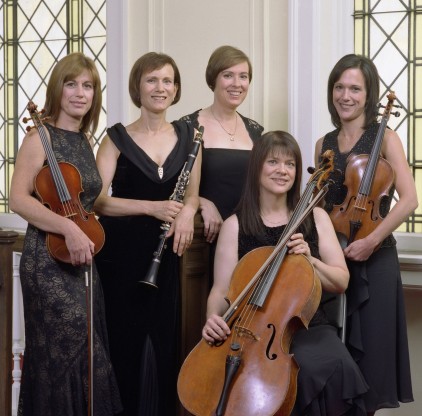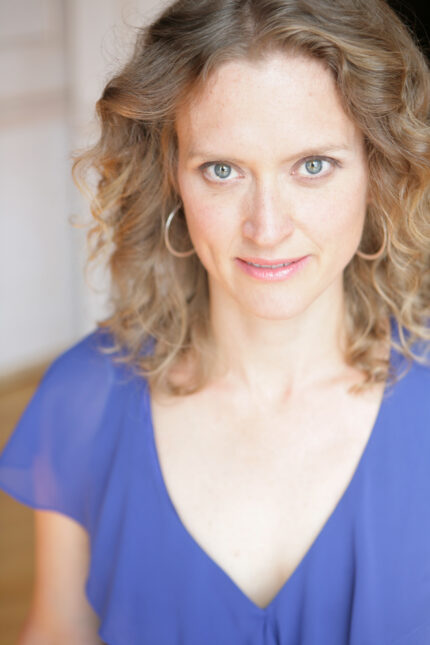Song cycle given compelling premiere by soprano, Orion Ensemble

The Orion Ensemble presented the quasi-premiere of a compelling new song cycle Wednesday night though it was an event not without some offstage drama.
Alicia Berneche who was to perform her newly commissioned version of Drew Hemenger’s Which Way Home? withdrew due to illness earlier this week. Fortunately, Chicago soprano Amy Conn successfully took her place and the show went on as scheduled at Ganz Hall.
Hemenger wrote his original cycle in 2003 for Berneche who wanted a set of songs based on texts of female poets who had committed suicide. For this new version, Hemenger has edited the cycle from eight songs to five, reordered them, and skilfully expanded the voice and piano original to the Orion forces of string trio, piano and clarinet (with some artful doubling on bass clarinet).
Which Way Home? is a moving and impressive achievement. Despite the potentially lugubrious subject matter, the songs, set to Anne Sexton’s plaintive poetry, offers a variety of expression.

Amy Conn gave superb advocacy to these challenging songs, singing with intensity and notably clear diction, conveying the delirious exultation, confusion, and bleak introspection with full tone and passionate commitment. The soprano also showed admirable control in not being distracted by the obbligato bass rumbling from the depths of the Auditorium, which sounded like Fafner emerging from his lair.
More controllable was the stage positioning, which proved ill-advised. With the soprano placed too far back from the stage and behind all the non-piano Orion members , she too often had to compete with their forceful playing. Still, soloist and ensemble provided an inspired sendoff to Hemenger’s revised cycle, which deserves a wide hearing.
The once popular Louis Spohr has been shot out of the canon, his name now among those composers whose music is more read about than performed. Yet in his time Spohr was highly regarded and wrote voluminously, including fifteen violin concertos, ten symphonies, numerous stage works and nearly a hundred songs.
Spohr’s Six German Songs for soprano, clarinet and piano are representative–attractive, well crafted works that evoke Schubert in their graceful flowing style, without ever approaching his melodic indelibility, let alone genius. Conn seemed a bit inhibited in the initial Spohr songs yet conveyed the lilting charm of Zweigesang and etched the nostalgic regret of Sehnsucht.
It was a bizarre inspiration to break the Spohr cycle in half by inserting the Hemenger songs in between. Still Conn seemed to bring a greater expressive thrust to the final three settings, as with the touching Wiegenlied and impassioned Das heimliche lied and Wach auf.
In these performances, the clarinet part proved an equal partner to the vocal soloist. While one would have at times liked a softer, more yielding expression, Kathryne Pirtle’s rich-toned, bravura clarinet playing was a vivid presence and, along with Conn and pianist Diana Schmuck, the three women made a worthy case for these graceful songs and hearing well, more of Spohr.
How many cities are there where one can hear two different chamber works by Erno von Dohnanyi in the same week? Sunday night it was members of the Chicago Philharmonic in Dohnanyi’s Sextet and Wednesday the Orion members, joined by CSO violinist Baird Dodge, served up the Hungarian composer’s Piano Quintet in C minor.
Dohnanyi’s Op. 1 impressed Brahms, as well it might, since the German composer’s shadow looms heavily over the work—especially the rhapsodic first movement, which alternates an easy-going quality with a more tense and driven expression.
The scherzo is diverting with a warm-hearted trio but it is the Adagio that is the high point, a lyrical outpouring that passes from solo viola to violin and cello, the music given full-throated advocacy by the musicians. The finale is less inspired with its folkish flavor mitigated by an obligatory-sounding fugue. Still Dohnanyi’s Piano Quintet is an intriguing work that surely deserves more performances and this lively, vigorous performance capped an enterprising and exceptional evening of music.
The program will be repeated 3 p.m. Nov. 22 at the Music Institute of Chicago in Evanston and 7 p.m. Nov. 29 at Fox Valley Pesbyterian Church in Geneva. www.orionensemble.org.
Posted in Performances

